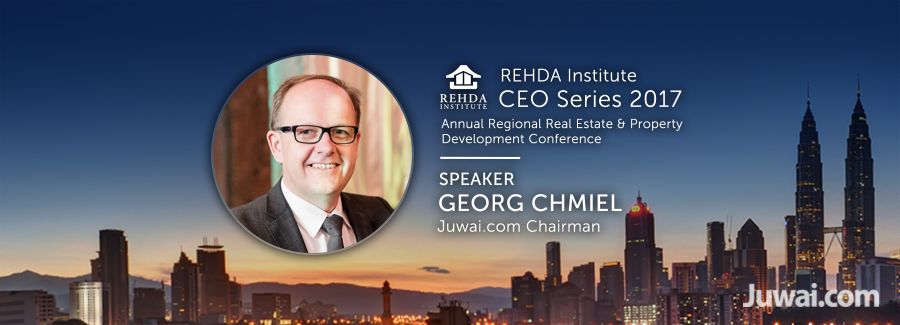You've successfully copied this link.
Juwai Chairman Georg Chmiel to speak at REHDA conference

Juwai Chairman Georg Chmiel to speak at the REHDA Institute CEO Series 2017 about innovation, technology and real estate in Malaysia.
With over 400 participants expected, the REHDA conference is an annual regional real estate and property development conference set to take place on 9 November 2017 at Kuala Lumpur, Malaysia.
This event aims to explore innovative ideas to create demand for under-utilised real estate space in Malaysia, as well as examine how to leverage technology to future-proof the property industry.
Serving as a platform for top CEOs, COOs, Managing Directors, and other senior management personnel, the REHDA Institute CEO Series 2017: Annual Regional Real Estate & Property Development Conference is supported by Juwai.com.
In 2016, many industry observers projected that China’s capital controls would slow Chinese investment in Malaysian real estate. In reality, the negative influence of capital controls has been at least partially offset by the positive influence of China’s One Belt One Road (OBOR) project.
While OBOR is in its early stages still, the massive plan still draws attention from Chinese consumers. In terms of residential property, Juwai.com’s Chinese buyer enquiry data shows interest has been on a rise since Q4 2015. While this enquiry demand in Malaysia started from a relatively low basis, the numbers are doubled y-o-y every quarter since January 2016, and enquiries have tripled since 2015.
REHDA Institute CEO Series 2017 Speakers and Panelists
As Juwai.com Chairman, Georg will impart insights and his experiences on developing effective real estate products that draw international property buyers into Malaysia.
He will also moderate a panel discussion on how information technology will revolutionise the real estate and property development industry.
Georg will stand alongside other participating industry leaders, who hail from diverse industries along the supply chain, such as banking and finance, fund managers, manufacturing companies, architects, engineers, construction and infrastructure-related companies, Federal, State and Local Government agencies, as well as property developers.
Other notable speakers include:
- Mayor of Kuala Lumpur, also known in Malay as ‘Datuk Bandar Kuala Lumpur’ (DBKL)
- Dato’ Jeffrey Ng Tiong Lip, CEO of Sunway REIT and Chairman of REHDA Institute
- Datuk Seri Michael Yam, Chairman of InvestKL and former REHDA President
- Sarkunan Subramaniam, Managing Director at Knight Frank Malaysia
- Stephen Hagger, Country Head at Credit Suisse Malaysia
- Manokaran Mottain, Chief Economist at Alliance Bank Malaysia
- Thong Mun Wai, RAM Rating Services Berhad
Malaysia's appeal to Chinese property investors
#1 Stable business infrastructure
Malaysia’s capital city of Kuala Lumpur offers robust business activities and resources for start-ups, and the city of Johor Bahru is just across from Singapore.
Foreign investment policies for ownership are also appealing to both mainland buyers and developers to Malaysia, particularly as these policies allow foreign buyers to own freehold properties – something not possible for them in China – or those with leasehold titles of 99 years.
#2 Established Chinese community
Malaysia has a well-established community of Chinese, and is a multi-racial haven to many other cultures as well.
Malaysia is home to a large China diaspora, which ranks as the world’s second-biggest overseas Chinese community after Thailand.1 This has resulted in a melting pot of various Chinese subgroups with their own cultures and dialects, including Mandarin, Hokkien, Cantonese, Hakka, Teochew, and Hainanese.2
Malaysian Chinese account for 23% of Malaysia’s population of 31.7 million, just ahead of Indians (7.0%), Others (1.0%), and non-Malaysian citizens (10.3%).3
These cultural and language similarities make Malaysia a desirable lifestyle destination for Chinese buyers.
#3 Easy foreign residency scheme
Malaysia’s ‘Malaysia My Second Home’ (MM2H) foreign residency scheme is relatively easy to get obtain, compared to similar schemes elsewhere in the world, and it’s the cheapest in the region.4
For comparison, the US’s EB-5 investor immigration programme requires foreigners to invest either a minimum of $1 million in a commercial enterprise or $500,000 within Targeted Employment Area (High Unemployment or Rural Area) and create/preserve 10 full-time jobs for qualifying American employees within a two-year period to qualify.5
Malaysia, however, only requires the investor to have liquid assets of minimum RM500,000 ($112,550) for those aged under 50, while those above the age of 50 only require liquid assets of RM350,000 ($787,85) to be eligible for a 10-year multiple entry visa with indefinite renewals for multiple family members.6
This makes Malaysia an appealing alternative emigration destination for both China’s wealthy and middle-class population.
Sources: 1. China Whisper: 6 places with strong Chinese communities outside mainland China; 2. SAYS: The origins of the Hokkien, Cantonese, and other Chinese dialect groups in Malaysia; 3. Department of Statistics Malaysia, Offical Portal: Current Population Estimates, 2014-2016; 4. Quartz: Why Chinese families will keep moving to Malaysia despite their anger over MH370; 5. U.S. Citizenship and Immigration Services: About the EB-5 Visa; 6. Official Portal Malaysia My Second Home Program
Liked this article? Sign up for free to get Juwai Juwai Asia Market updates!
2025 © Juwai. All Rights Reserved Privacy Policy | Terms of Service


